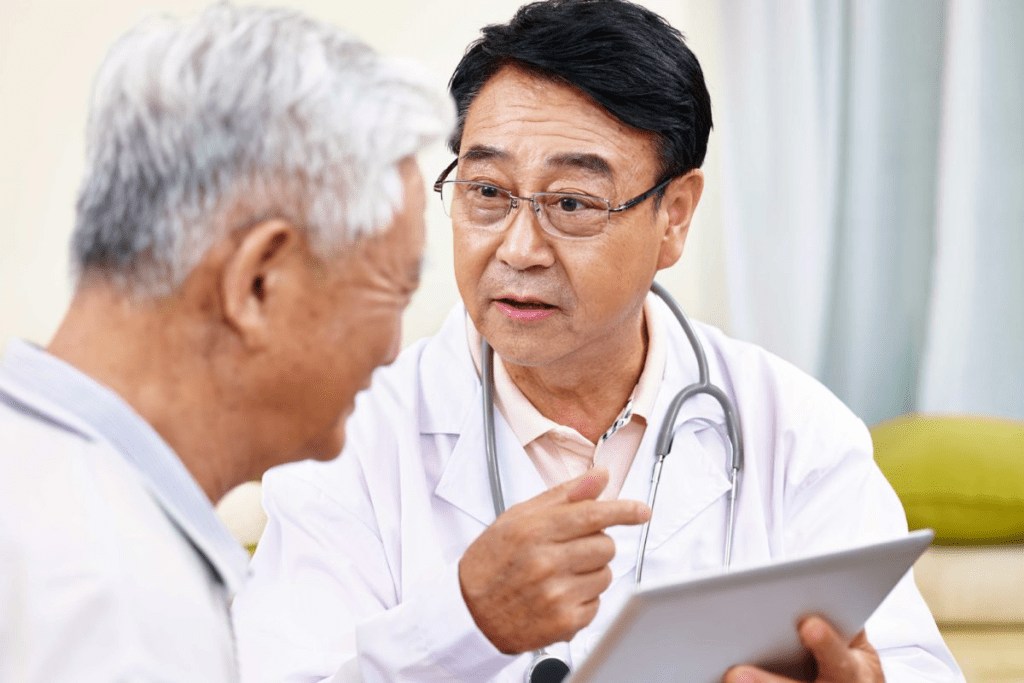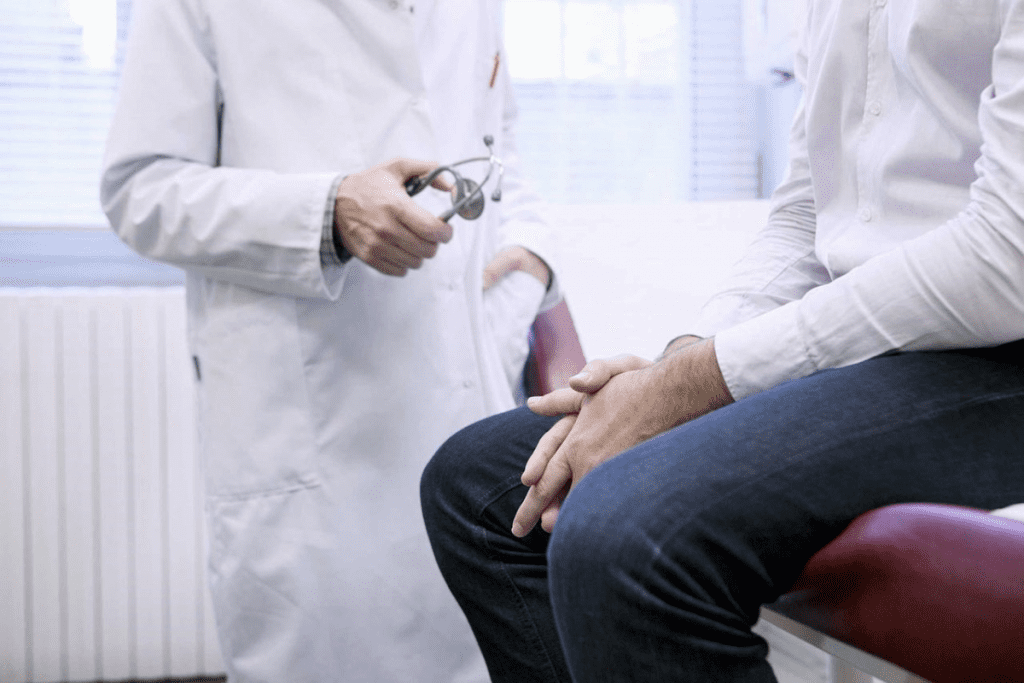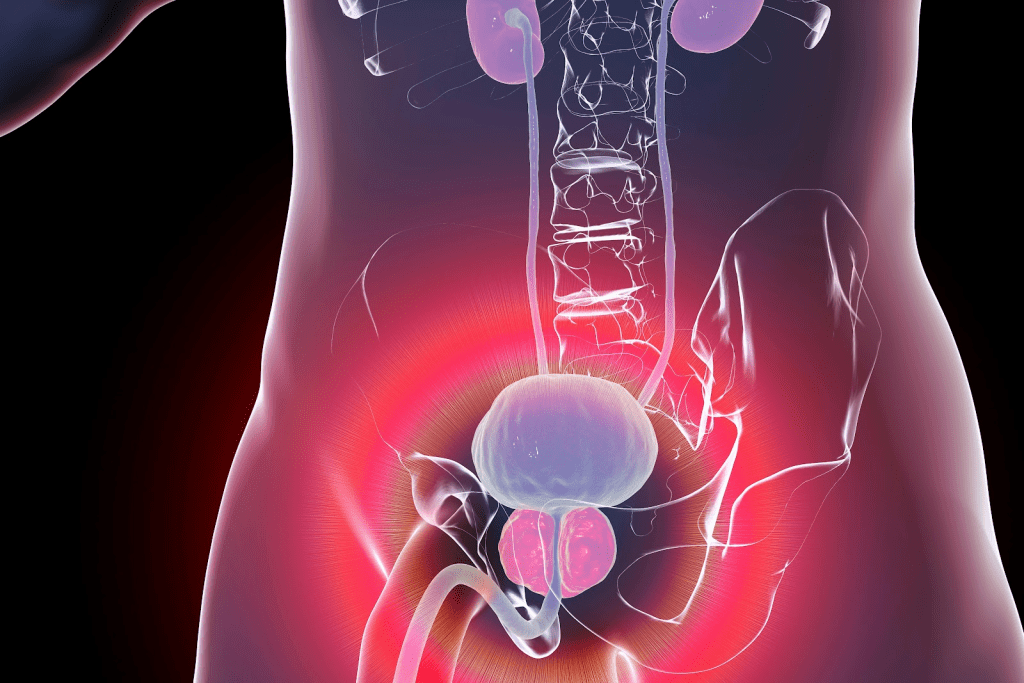Last Updated on October 31, 2025 by
Men in Japan have lower rates of prostate cancer and related issues than Western men. By 2025, nearly 91,800 new cases are expected in Japan.

We look into why this is the case. We examine dietary habits and lifestyle differences. These insights can help us prevent prostate health problems. We examine dietary and lifestyle factors and the efficacy of japanese prostate treatment approaches.
Prostate cancer rates are much lower in Japan than in Western countries. This difference has caught the attention of many in the medical field. It shows a big gap in prostate health between Japan and Western nations.

Research shows that Asian populations, like Japan, have lower prostate cancer rates than Westerners. Even though Japan is seeing more cases, the death rates are lower than in many Western countries.
The data clearly shows a big difference in prostate health between Japan and Western countries. Japan’s lower death rates from prostate cancer are a key point. This is true even as more cases are being reported.
By 2025, Japan is expected to see nearly 91,800 new prostate cancer cases. This is an increase, but the death rates are expected to stay lower than in many Western countries. This shows that while more cases are being found, Japan’s health outcomes are better.
In Japan, the number of prostate cancer cases is going up. But the death rates are staying lower than in Western countries. This calls for more research into why these differences exist.
The Japanese diet is packed with foods that help fight prostate cancer. It’s full of foods that are good for your prostate. This diet is known for its health benefits.
The Japanese love their seafood, which is full of omega-3 fatty acids. These fats are anti-inflammatory and may lower prostate cancer risk. Studies show that eating a lot of omega-3s can help prevent prostate cancer (Source). We’ll see how these foods help your prostate stay healthy.
Soy is a big part of the Japanese diet, full of phytoestrogens like isoflavones. Isoflavones might lower the risk of prostate cancer. Eating soy can also help with other health issues.
Green tea is a key part of the Japanese diet, known for its antioxidants. The catechins in green tea might fight cancer, including prostate cancer. Drinking green tea regularly helps protect against prostate problems.

Research into Japanese men’s genetics has found unique traits linked to lower prostate cancer risk. We look into these genetic factors.
Genetic studies show Japanese men have different genomic profiles than Western men. For example, mutations in TP53 and BRCA2 genes are less common in Japanese men. This genetic difference may help explain Japan’s lower prostate cancer rates.
Research found genetic variations in Japanese men that might protect against prostate cancer. These include changes in genes related to hormone metabolism and DNA repair. These genetic factors, combined with environmental influences, may explain why Japanese men are less likely to get prostate cancer.
Family history is a big factor in prostate cancer risk. Hereditary factors are thought to help Japanese men avoid prostate cancer. Studies found certain genetic variants linked to prostate cancer are less common in Japan. This hereditary aspect, along with unique genomic profiles, may boost resistance to prostate cancer.
Learning about the genetic and hereditary factors behind prostate cancer resistance in Japanese men is key. It helps us understand how to prevent and treat prostate cancer. By studying these factors, we gain insights into the complex relationship between genetics, environment, and lifestyle in prostate cancer.
Lifestyle choices, not just what we eat, affect prostate health in Japanese men. As their lifestyle becomes more Western, so does the risk of prostate issues. This shows that lifestyle factors beyond diet are key to prostate health.
Many lifestyle elements help Japanese men avoid prostate problems. These include how active they are, their body shape, and their exposure to harmful substances.
Being active is important for prostate health. Research shows that regular exercise can lower prostate cancer risk. Japanese men tend to be more active than those in the West. A study on PubMed Central found that activity is linked to lower cancer risk.
Body shape also matters. Japanese men usually have lower BMIs and less belly fat than Western men. Too much belly fat is linked to aggressive prostate cancer.
Environmental factors and exposure to harmful substances also affect prostate health. Japanese men might be exposed to different pollutants than men in other places.
A study found that some toxins increase prostate cancer risk. Japan’s unique environment, with less exposure to certain toxins, might help explain lower prostate problem rates.
Experts say, “Environmental factors are key in prostate cancer development. Understanding them helps in finding ways to prevent it.”
We see that lifestyle choices, not just diet, are important in prostate health differences between Japanese and Western men. By looking at these factors, we can find ways to prevent prostate problems.
In Japan, prostate treatment combines traditional and modern medicine. This mix is more than just treatments. It’s a whole-body approach that focuses on the patient’s health.
The success of prostate treatment in Japan comes from blending old and new medicine. Traditional Japanese medicine uses natural remedies and focuses on overall health. For example, green tea is known for fighting cancer. We add these traditional elements to treatment plans for a complete care approach.
We aim for the best of both worlds in prostate treatment. By mixing modern tech with traditional wisdom, we offer better treatment options.
Early detection is key in fighting prostate cancer. Japan has strict screening rules for early diagnosis. We use top-notch tools like MRI and biomarker tests to catch issues early. This early action boosts treatment success.
The success of prostate treatment in Japan also comes from team work. At Liv Hospital, we have teams of experts like urologists and nutritionists. They work together to create custom treatment plans. This team effort makes sure all health aspects are covered.
As Liv Hospital introduces new treatments like Rezş«m Water Vapor Therapy, we aim to give patients top-notch care. Our team work and use of the latest tech mean we can offer the best care.
Japan’s approach to prostate treatment is a model for others. It combines traditional and modern medicine, focuses on early detection, and uses team-based care. We keep improving to give our patients the best results.
The Western way of life is changing Japanese habits, affecting prostate health. We see diet, lifestyle, and environment changes. These changes are challenging Japan’s traditional prostate health benefits.
The old Japanese diet, full of seafood, soy, and green tea, helped keep prostate cancer low. But, as diets get more Western, with more red meat and processed foods, the benefits are fading. This shift is a big worry because it links to more prostate cancer cases.
“The change in diet is not just about food; it’s about lifestyle and environment too,” says a top researcher. This shows the issue is complex, with diet being just one part of many lifestyle changes.
Prostate cancer is becoming more common in younger Japanese people. This is very concerning because it could mean more cases in the future. Diet, less exercise, and genetics might all play a role.
Watching these trends closely is key. We need to spread the word and encourage prevention. Japan’s move towards Western lifestyles shows how lifestyle and environment affect prostate health.
Learning about Japan’s lower prostate cancer rates can help us globally. The Japan Public Health Center-based Prospective Study has given us important data. It shows how diet, genetics, and lifestyle affect prostate cancer.
The Japanese way of life and genetics are key to their lower cancer rates. Their diet, full of seafood, soy, and green tea, helps protect against prostate cancer. Physical activity and body type also play a big role.
Using Japan’s lessons, we can fight prostate cancer better worldwide. As Japan’s diet and lifestyle become more Western, watching prostate cancer rates is important. Japan’s insights can guide global efforts, helping us understand prostate health better.
Diet, genetics, and lifestyle are key. The Japanese diet, rich in seafood, soy, and green tea, helps keep the prostate healthy.
The diet is full of omega-3s from seafood, phytoestrogens from soy, and green tea’s cancer-fighting properties. Together, they protect against prostate cancer.
Yes, genetics play a role. Japanese men have genetic traits that may protect against prostate cancer. Research shows certain genes are more common in Japan, helping lower cancer risk.
Lifestyle matters too. Japanese men are more active and have lower body fat. This helps their prostate health.
Japan combines traditional and modern medicine. They focus on early detection and use teams for treatment. This approach is effective in managing prostate cancer.
Western diets and lifestyles are changing Japan. This is leading to more prostate cancer in younger men. It’s important to focus on prevention and raise awareness.
Japan’s experience teaches us about diet, genetics, and lifestyle’s impact. We can use this knowledge to prevent and manage prostate cancer worldwide. Japan’s lessons can help improve global prostate health.
Green tea has cancer-fighting properties. Studies suggest it may lower prostate cancer risk. Japan’s green tea consumption is a factor in their lower cancer rates.
Yes, Japan has early detection and screening for prostate cancer. Regular check-ups and screenings are key, mainly for high-risk men.
Global Cancer Observatory. (2020). Prostate cancer: Estimated incidence, mortality and prevalence worldwide in 2020. Retrieved from https://gco.iarc.fr/today/data/factsheets/cancers/27-Prostate-fact-sheet.pdf
Kurahashi, N., et al. (2007). Soy product and isoflavone consumption in relation to prostate cancer in Japanese men. Cancer Epidemiology, Biomarkers & Prevention, 16(3), 538“545. Retrieved from https://mhlw-grants.niph.go.jp/system/files/2006/064051/200638017A/200638017A0006.pdf
Subscribe to our e-newsletter to stay informed about the latest innovations in the world of health and exclusive offers!